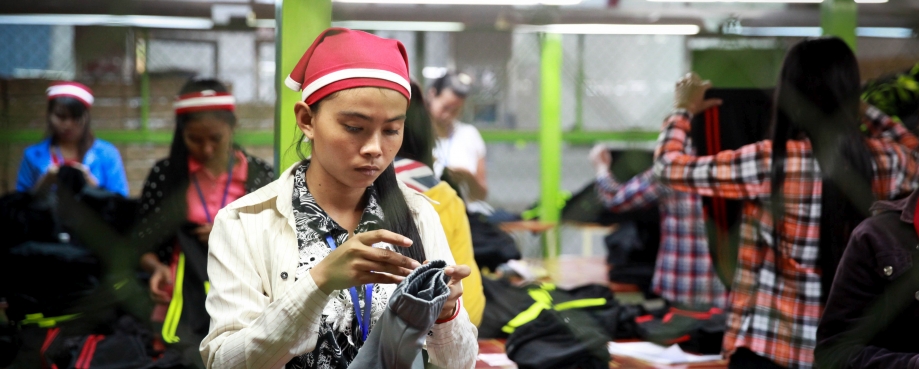
H&M group’s Fair Living Wage Strategy represents a “bold and unprecedented” commitment on wages, yet there are major lessons to be learned around how it has been implemented, according to an independent evaluation published today (Dec 11) by the Ethical Trading Initiative ahead of H&M group’s Fair Living Wage Summit in Cambodia.
Commissioned by H&M group and prepared by a group of independent reviewers, the report evaluates H&M group’s Fair Living Wage Strategy and its progress in the five years since roll out. It concludes that the strategy shows real leadership and has delivered progress in certain areas, but has underestimated the scale and complexity of the challenges, with the result that on-the-ground progress in some areas has been slower than expected.
The report highlights the strategy’s main achievements, including strong support from most external stakeholders; efforts to improve wage management across 500 supplier factories; and substantial progress on improving workers’ ability to negotiate on wages and conditions. There is evidence of slight incremental rises in some workers’ wages; however, even in top performing factories some workers still report that wages aren’t enough to cover living costs.
The report goes on to analyse the factors that may have affected progress, including: political and economic developments in sourcing countries; H&M group’s business performance; and local regulatory changes such as restrictions on trade unions and civil society.
Despite these challenges, the report praises H&M’s willingness to learn and adapt and finds significant support amongst external stakeholders for it to continue its efforts through the strategy.
Peter McAllister, Executive Director of the Ethical Trading Initiative (ETI), said: “H&M has shown genuine leadership on the issue of wages, even if it appears to have underestimated the scale of the challenge. It’s clear that lessons need to be learned, but we should remember that H&M is the first major apparel brand to make such commitments. While it’s only right that it should be held to its commitments, it’s just as important to recognise the progress it has made. After all, the vast majority of brands are conspicuously silent on wages, and we mustn’t allow this to be seen as the safest option.
“Despite the challenges, it’s critical that H&M continues its efforts to raise workers’ wages, and we hope to see it learning from the lessons of the first five years to expand and improve its work on the ground. We also hope to see other brands learning from H&M’s example. The issue of living wages is much bigger than any one brand and if we are to make sure all garment workers receive a decent wage then industry-wide action has to be the priority.”
Drawing on the findings, the authors make various recommendations for H&M group’s continued efforts, calling on the brand to:
Focus its efforts on improving the basic rate of pay for all workers, and particularly for women. This should involve working closely with suppliers to achieve a standard weekly wage that is closer to a living wage in factories where the brand has greater leverage.
- Calculate the real cost of living in production countries, working with relevant organisations.
- Make clearer and more realistic public commitments. Early communications around the strategy appear to have raised public expectations beyond its original intentions, creating the impression that the brand wanted to deliver a living wage for 850,000 workers by 2018. In other statements, the brand was explicit that it wasn’t going to establish specific wage levels or rates.
- Provide updates on progress, including successes and opportunities for improvement, and clearly explain any adjustments to the strategy.
- Establish an effective monitoring and evaluation system that measures the strategy’s outcomes and particularly its impact on wage levels. At present there is a lack of data to show the direct impact of the strategy on workers’ wages and the effectiveness of worker committees. It would be helpful to see a more systematic collection of data, ideally involving a robust third-party.
- Accelerate improvements in buying practices. As part of this, the brand should aim to provide suppliers with more accurate order information and improve production planning. The actual experience of suppliers should be measured by a third party rather than by H&M itself.
- Review the resources it has committed to the strategy to see if they are sufficient given the scope and scale of the activities involved.
/ENDS
For more information or to request the report, please contact Tom Phillips, Media and Communications Manager, on 020 7841 4352 or email tom.phillips@eti.org.uk
NOTES TO EDITORS
- The report was prepared by Sabita Banerji, Katharine Earley, and Peter McAllister (ETI), with support from Martin Buttle (ETI), Prof. Raymond Robertson, Ben Rutledge (ETI)
- Disclaimer: This report represents the views of the reviewers and not necessarily those of the Ethical Trading Initiative (ETI) or any other organisation.
- While H&M is a member of ETI, the evaluation was conducted with the understanding that reviewers would follow an independent and transparent process.
